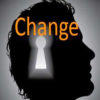The brain seems hardwired to be conservative? Yes, to exert the minimum amount of energy necessary. It’s why recovery from brain injury is so difficult. It tries to achieve homoeostasis even in preference to optimal function. Long story short, the brain doesn’t like change. It is also a poor judge of causality. Its only sense of causal agency is proximity in space or time or both. The brains natural assumption is that if one thing happened then something else seemed to happen right after that, then the one thing caused the other.
Brain seems like an anti-entropy device. Indeed it is that. Anti-entropy = survival.
The brain by itself is in some ways really rather mechanistic. The very core of our brain, the part that organizes all the rest, the thalamic nucleus which is the heart of the thalamic loop, registers and labels everything according to spacial sets, spacial frames, like a photograph, and temporal sets, things that occurred in the same constrained moment of time. Thus our bad mood will register everything we sensed while feeling down as if it were a source of that mood, like Christmas carols and depression, say. It’s involuntary, reflexive, and not at all in touch with reality. When people describe change, what they perceive as change, the only change you will generally hear about is not change at all. It’s homoeostatic fatigue.
Do people really ever describe positive events in the personal context? Do they say I am a lottery winner, or I am a boyfriend/girlfriend?
No, that’s looked down on as bragging. They describe positive events as objective occurrences, and negative events as items of identity. We identify with our pains and needs. We don’t identify with satisfaction. I am a lunch eater. I ate lunch.
Mitch Hedburg even made a joke about it. He spoke of making a business card to put into jars at various restaurants because of the contests they held commonly for a while, describing himself as a future lunch winner. Why don’t people describe themselves in that way according to intention as opposed to experience? Any ideas?
One of the “tricks” of hypnosis in nicotine addiction is to have the person say “I am a non-smoker.” To identify as a non-smoker. Yes. We hypnotize ourselves with our history which is mostly a registry of fears, pains and problems. The strange thing – and I will take a stab at explaining why we identify as our histories rather than our intentions – we are addicts of our so called real life. While we are having an experience, in the very moment we are experiencing it, there is no coherent understanding available, no single narrative.
Say, for example, you accidentally cut your finger on an aluminium can lid. It’s a common experience, yes? There is no reason why. The events occurring around the accident offer little or nothing to help you understand what happened. It just registers in your short term memory, in the regions of the brain known as the hippocampus.
It’s the reason people lament ‘why me?’ when something happens. They want the story to answer that question.
It’s the reason any new experience sticks with you for a bit, and it picks up its information directly from the senses. Ever have the fact that you cut yourself skip your mind right after it happened? Perhaps I have to rephrase the question. Ever forget that you cut your finger as soon as you cut it?
No. I’d have to be distracted.
This echoing of the experience continues until the semantic memory takes over. Semantic memory is body or muscle memory, and your body and brain will retain it over anything else. It treats it as the most vital. Your body remembers that you had your finger in motion against a can lid when it was cut.
It’s how we keep going after injury? Echoing of experience is shock? Actually, echoing of experience is just memory. It happens with pleasure also, like the afterglow after a sexual experience, even serves to promote pair bonding in that case, make you feel just a bit closer to your partner. It’s only after any experience registers on your semantic or visceral memory that it registers on what they call the autobiographical memory. It starts becoming a story, something you consciously think about.
Your thoughts are welcome. Be well friends.
Travis Saunders
Dragon Intuitive
~science,mysticism,spirituality~



Leave a Reply